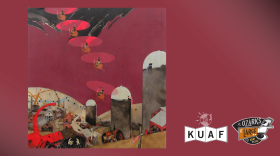KELLAMS: This is Ozarks at large. I'm Kyle Kellams. It's likely more has been written about Bill Clinton than any other Arkansan, but we still have things we can learn about the former president's life, and a new insight into him can be found in the book The Boy Next Door My Sixty Year Friendship with Bill Clinton. Carolyn Staley wrote the book, and she remembers that she and Bill Clinton met soon after the Clintons had moved next door to her family in Hot Springs. She describes a teenage Bill Clinton as charismatic, and she recalls their first ever meeting
STALEY: I do. I absolutely do. The doorbell rang and I went to the door and there stood Bill. I had seen him at school. I knew what he looked like. As I wrote, I had been in a geometry class and went outside to get a drink of water before class started, and he was talking with a friend and said, and she's going to be my next-door neighbor. So that's when I knew that he knew who I was. And we still hadn't talked directly. That was really neat to know that we were about to embark on a relationship as next door neighbors.
KELLAMS: Carolyn Staley will discuss the book at the Fayetteville Public Library Wednesday night, September 10, at 6 p.m. She says their friendship was strengthened by a mutual love for music. She piano, and he, famously, of course, the saxophone. They also shared a mutual desire to earn top grades and top scores in music competitions. Carolyn Staley says her next door neighbor had a competitive streak.
STALEY: He sure was. And I guess I was too. I wanted to get a top score, too. He would go and look at the scores as they came in. He would find me and tell me, “You got it first. You got a one.” They would post them out on a roll out in the hall- a standing bulletin board and tack up the scores. Did we make a first or a second or what? Of course, what you wanted was first. So that was always very exciting. Actually, his mother collected all those medals, and she framed them. I'm sure to his horror. She hung it in the living room with his high school portrait, senior class picture, and we called it the shrine. We were irreverent even then.
KELLAMS: It sounds like he was competitive, but he also wasn't so competitive that he wanted his friends to not do well as well. It sounds like he celebrated everybody.
STALEY: That's right. Oh no. He definitely was cheering me on. And I'm sure all his other friends, too. He was happy when we all did well. But first things first, he wanted to do well. But, you're right. He wasn't just totally consumed with his scores. He was glad to check mine, too and tell me what I did.
KELLAMS: Let me give you a short list. And I'm sure that you know what this list is. It's John Paul Hammerschmidt, it's Frank white, it's Carolyn Staley. What do those three people have in common?
STALEY: Oh, well, the first two are much more significant than mine. But I did beat him for class secretary. That was the role. I had been class secretary. This was a senior class, and our I had been junior class secretary, so I already had had the job. Plus, secretary means a girl, I think. Back then, it did. I think it was kind of a gender specific job.
Anyway, the way that happened was our high school principal, Johnnie Mae Mackie, who was just a phenomenal woman, came up with a point system to assign to elected offices. Whether it was a club, a band, major, student council role, class secretary or president role because she wanted to spread around leadership opportunities and to keep the same people from being elected to everything, she assigned points, to elected positions.
Bill had used up his points. He only could run for secretary. There were others nominated. We wound up in a runoff, and he and I were out in the hallway waiting for the final vote. He looked at me and he said, “So help me, if you beat me for this, I'll never forget it.”
I don't know whether he has forgotten it, but I've teased him about it. When we had our high school reunions and he was president I laughingly said from the stage, “The good news about your job is it's term limited. I have to serve as class secretary until we decide to stop having reunions. It's a lifelong post.” He had a good laugh out of that.
KELLAMS: You were great friends in high school. He goes to Georgetown. You're thousands of miles away on different campuses. What do you think it was that kept you in touch and great friends, because so many high school friendships that are separated by half a continent don't last. What do you think it was?
STALEY: Well, I was thinking about how technology has totally changed our lives since those years. We wrote letters pretty much every week, and I always looked forward to going to my mailbox to check it and to see if I'd gotten a letter from him. And that was a banner day. We sometimes set up a time to call, but not that often because dorm rooms didn't have phones. You had to go out in the hall or find a payphone. So, it was mostly letter writing.
KELLAMS: I'm speaking with Carolyn Staley, author of The Boy Next Door My Sixty Year Friendship with Bill Clinton. And as that second part of the title suggests, it's a sixty-year friendship. This isn't just something that was in high school and college. When he becomes governor, you essentially become neighbors again, right?
STALEY: My husband and I kept in touch with him during his years as attorney general. And when he ran for governor and he called us, we were living in northwest Indiana at on the faculty at Valparaiso University. He said, “I always thought if I did something good with my life, maybe you would come home and be a part of it. I'm asking you to do that.” And then, “I wonder if we could be neighbors again.”
My husband and I chatted about that. We love old houses and the governor's mansion was in what's known as the Quapaw Quarter in downtown Little Rock. We found a house that was slated for demolition. We had enough money saved to put down a down payment and just dove in and started the renovation process. We made it livable room by room. He was about three or four blocks from us, and he was in and out all the time, which was loads of fun.
KELLAMS: And of course, you were friends when Bill and Hillary Clinton welcomed Chelsea into the world.
STALEY: I was. We were. I remember when he yelled to the state troopers, “We've got to get home.” I think he was on the road somewhere. “This baby's coming. This kid's on the way.” He had gone to the child birthing classes with Hillary and was expected to be at her side and he made it. He was there. It was so much fun to watch that new experience in their lives as they became parents.
KELLAMS: You also performed. You’re a singer and at the Inaugurals. I think at one time he wanted you to sing for some guests because he said, “It's good politics.”
STALEY: Right. I was staying at the governor's mansion looking for our house, and a family from El Dorado came. She was the chairman, Theodosia Nolan of the Murphy Oil family, of the Arts Council. Plus, all of the family and friends in El Dorado that were with them were big donors of his. I never had heard that term: go ahead and sing for me, it's good politics.
I learned right away that sometimes you do things, because it means points. I was glad because I wound up being director of the State Arts Council and Theodosia, the chairman, and I became really good friends. That was that was a good experience. But, yes, he asked me. Hillary asked me often to play music for the mansion, Christmas parties and other dinner parties and special events that they would have- legislators over or different whatever. I would play background music in the living room at the piano there.
At Christmas we had a load of fun with props and hats and Rudolph noses and antlers for the reindeer. For the “Twelve Days of Christmas” I had props for every day of Christmas. Chelsea would pick out the guest to be each. She would enlist the singers to take each role. Bill would sometimes be Santa, or sometimes he was Rudolph and would put the red nose on and walk through the governor's mansion living room with people behind him. It was always just a load of fun.
Then after guests left, sometimes I took that opportunity to sing or play something for him that I had just learned. I had been teaching at a Catholic school in Indiana before we moved to Arkansas, and I had learned a beautiful song written by a Saint Louis Jesuit composer Bob Dufford, and it's called “Be Not Afraid”. It's still in the Catholic hymnal in the pews today. It’s a real favorite. I sang it for him, and he said, “Oh, you've got to sing that at my inauguration.” It's from the scripture Isaiah forty-three that starts, “Do not be afraid. I am with you always. When you pass through raging waters, you won't drown. When you walk amid burning flames, you won't be harmed. When you stand before the powers of hell, know that I'm with you through it all.”
It's just a real song of encouragement and comfort and reassurance. I sang at his first inauguration, but he didn't know that song yet. But at every one since, and there was maybe three or four as governor and then the two as president, he asked me to sing that song, “Be Not Afraid”. I included the words in the book.
KELLAMS: There's so many favorite parts for me for this book, from Barbra Streisand handing you a wonderful compliment to your face. But my favorite part is when you recollect when you and the future president of the United States, when you're very young and as you're going through your teenage years into your twenties, you had conversations about what- as we all do when we're young- what you wanted to be in the future. What you wanted, your future. Like what you wanted your future husband or wife to be like. I love that you recounted some of those stories and conversations.
STALEY: Oh, good. Well, thanks. I mean, we never were, a serious item of any kind, but he brought it up one time: have you ever thought about the person you're going to marry and what they'll be like? That was an interesting conversation. I said, “Well, I want him to be kind and faithful and supportive of me and whatever direction I take.”
The women's movement had not happened yet. I was still thinking pretty much traditional, although I could see myself working, probably teaching music. Of course, his mother had worked all his life as a young boy, so he grew up with that vision that the wife would probably work outside the home and have her own career identity. We chatted about all that.
KELLAMS: Before we go, I have to ask about a sandwich he was renowned for making, apparently, when he was in high school: Deli meat and peanut butter?
STALEY: I know. It was unbelievable. Virginia kept everything possible, usually a lot of tuna fish, so that was a staple. But sometimes he took Rye bread and slathered on peanut butter and then found some lunch meat, salami, whatever, and then sometimes put a piece of cheese on top of that and put it all together.
Thing that I remember is that he never invited any of the rest of us to savor these delights. I think he knew that they were pretty much, one of a kind of his own liking. He would build these humongous sandwiches after school. And he loved fried pies. The housekeeper sometimes made a plate full of a platter of fried pies. And that was a little bit of heaven on earth when he came home from school and saw those.
KELLAMS: And one last question. You, went to Girls Nation, he went to Boys Nation- that comes out of Girls state and Boys State now, right? I know when I was part of that program, only one individual, maybe two from Boys State went on to Boys Nation. What are the odds that next door neighbors represent the state?
STALEY: Well, it was because Boys Nation and Girls Nation were patterned after the Senate. Every state has two senators. Arkansas sent two girls and two guys. The fact that two of us were neighbors was a total coincidence. It made it such a rich experience that we both got to meet John Kennedy in the Rose Garden. I remember riding the elevator with Lyndon Johnson, spending the day with Everett Dirksen and his office because I was minority leader of the Senate and that was his job.
It was just a phenomenal week. The whole program was designed to invite you to run for office and to come to Washington and serve.
KELLAMS: The name of the book is The Boy Next Door My Sixty Year Friendship with Bill Clinton. Carolyn Staley will be at the Fayetteville Public Library talking about the book on Wednesday, September 10 at 6 p.m. that's going to be in the Walker Community Room. Thank you so much for your time.
STALEY: Thank you. Kyle, it's been a pleasure speaking with you and with your listeners, and I hope that I'll get to see many of you at the library. Thank you.
KELLAMS: Our interview took place by phone late last month. Carolyn Staley will discuss her book, The Boy Next Door My Sixty Year Friendship with Bill Clinton at the Fayetteville Public Library Wednesday night, September 10 at six p.m.
Ozarks at Large transcripts are created on a rush deadline. Copy editors utilize AI tools to review work. KUAF does not publish content created by AI. Please reach out to kuafinfo@uark.edu to report an issue. The audio version is the authoritative record of KUAF programming.








